Effects of nicotine on cognitive functioning of healthy smokers and non-smokers
Protopapas A., Pliatsikas C.*, Travlou L.
Institute for Language & Speech Processing
1. Introduction
This study examined the effects of nicotine on human cognitive functions, in particular memory, attention and verbal reasoning.
Previous studies have used a variety of methods and have produced equivocal conclusions. Overall, there is evidence that nicotine has a positive effect on reaction time, but it is not clear whether it has any effect on the cognitive functions themselves.
Proper assessment requires a placebo condition and taking into account smoking habits.
2. Experimental design
Nicotine patches or identical placebos were applied in the morning on 12 smokers and 12 nonsmokers (smokers receiving higher doses). Each participant received both treatments, on different days.
Participants were tested 6-8 hours later with computerized versions of a Logical Reasoning test and a Continuous Perform-ance test, and with a Greek version of the California Verbal Learning Test.
3. Logical Reasoning
Each participant was presented with the letters A and B on a computer screen (either "AB" or "BA") followed by a description of their position (e.g. "A is not after B"). The task was to judge whether the description is true or false and to respond with a mouse button. The number of errors and mean response time to 32 trials were measured.
4. Continuous Performance
In the CPT participants had to respond as quickly as possible to the appearance on the screen of a specific target stimulus (the letter X) and to avoid any response to other (non-target) stimuli (other letters). 135 targets (90%) and 15 non-targets appeared for 250 ms each, separated by 2000 ms.
Measurements included reaction time and number of two error categories: misses (targets not responded to) and false alarms (responses to non-targets).
5. Verbal Learning
A list of 16 words, from 4 semantic categories, was read to the participant 5 times, noting the number of words recalled after each repetition (no time constraint) and the number of semantic clusters (successive recalled words from the same semantic category). Different lists were used for the two treatment conditions.
6. Results
Nicotine effects were observed only on the CPT, including more false alarms (F1,15=4.64, p<0.05) and marginally faster respones to targets (F1,15=3.80, p=0.07).
There was a gradual increase in the number of recalled words and number of semantic clusters in CVLT with each repetition of the list (linear trends p<0.0005) but no effect of nicotine.
There were no significant effects of smoking group.
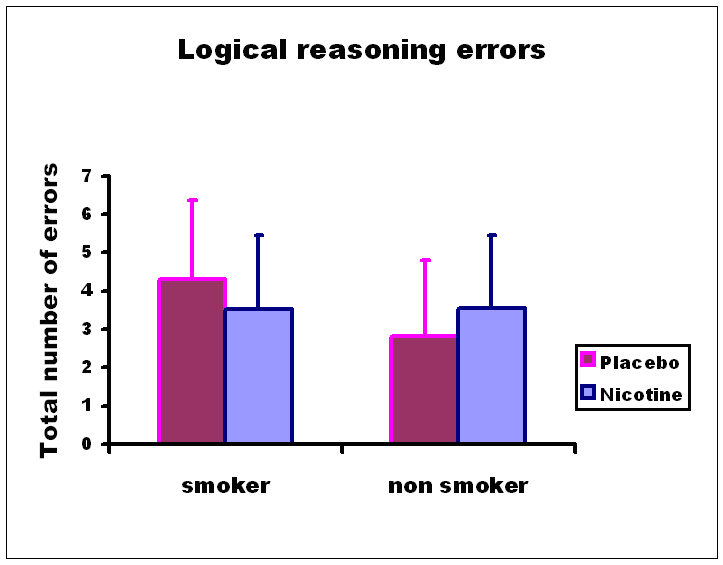
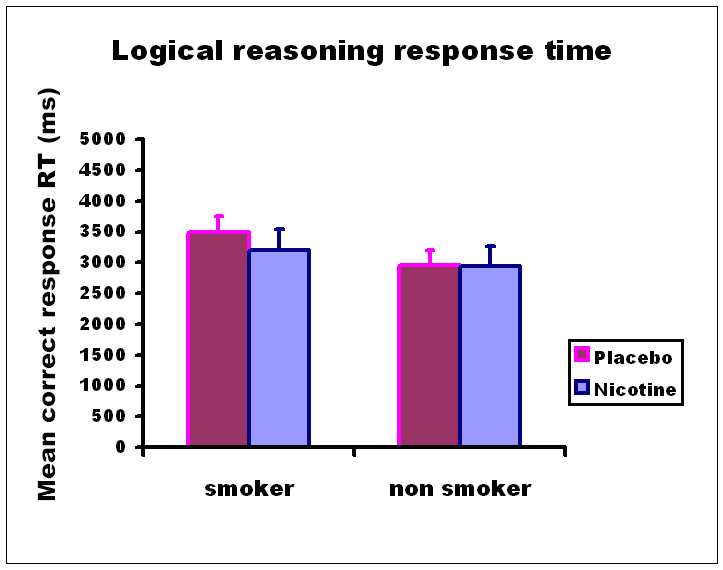
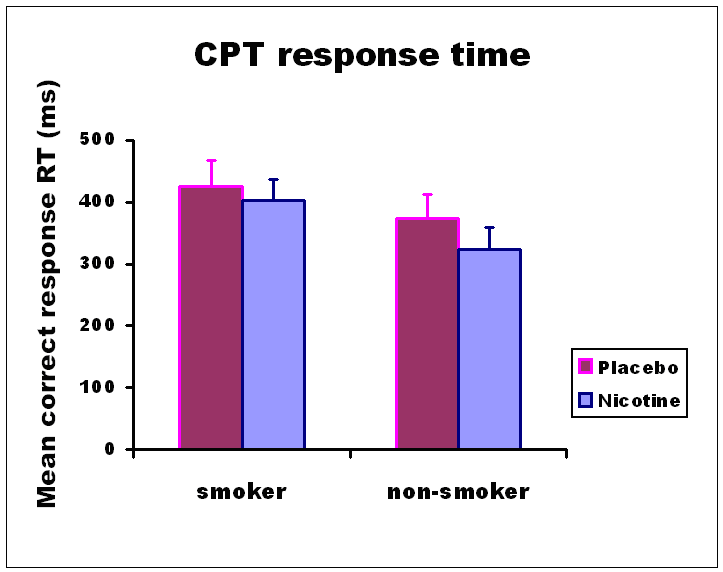
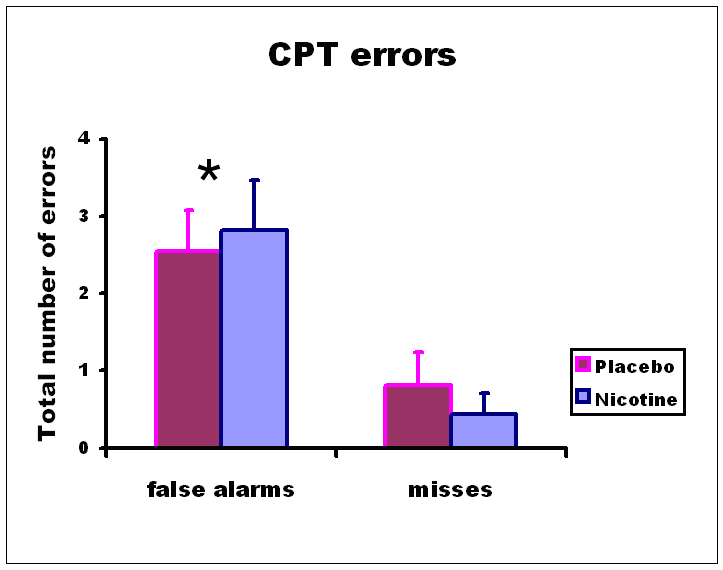
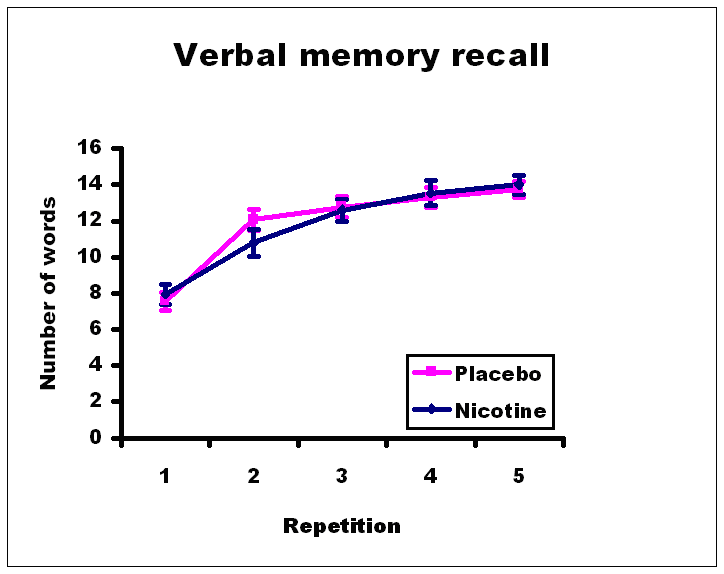
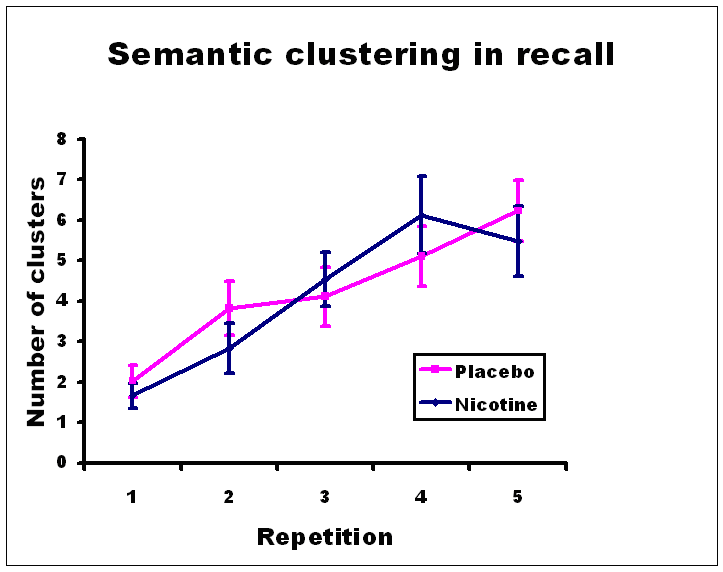
7. Discussion
Logical Reasoning results (no effect of nicotine on speed or accuracy for smokers or non-smokers) confirm findings of previous studies.
CVLT results (no nicotine effect on words recalled or on semantic clustering) are also in agreement with most previous findings regarding free recall.
Finally, CPT results (apparent weak increase in impulsiveness) agree with the ambiguous picture seen in the literature concerning attentional processes.
8. General discussion
Nicotine acts in the CNS through cholinergic modulation, potentially affecting cognitive processes such as attention and memory consolidation. Support- ing this connection, cholinester-ase inhibitors reduce memory decline in Alzheimer's disease.
Cognitive effects of trans-dermally administered nicotine in persons without Alzheimer's disease seem to be insignificant, indicating that nicotinic receptor action relates to cognitive func-tion in subtle and complex ways.
References
- Levin et al (1998). Transdermal nicotine effects on attention. Psychopharmacology 140: 135-141
- Herzig et al (1997). Effects of cotinine on information processing in nonsmokers. Psychopharmacology 135: 127-132
- Hindmarch et al (1989). Effects of nicotine gum on psychomotor performance in smokers and non-smokers. Psychopharmacology 100: 535-541
- Heishman (2000). Tolerance to repeated nicotine administration on performance, subjective, and physiological responses in nonsmokers, Psychopharmacology 152: 321-333
- Ernst et al (2001). Smoking history and nicotine effects on cognitive performance. Neuropsycho-pharmacology 25: 313-319
- Rezvani & Levin (2001): Cognitive effects of nicotine. Biological psychiatry 49: 258-267
- Warburton & Mancuso (1997). Evaluation of the information processing and mood effects of a transdermal nicotine patch. Psychopharmacology 135: 305-310
- Rusted et al (1997). Effortful processing is a requirement for nicotine-induced improvements in memory. Psychopharmacology 138: 362-368
- Foulds et al (1996). Cognitive performance effects on subcutaneous nicotine in smokers and never-smokers. Psychopharmacology 127: 31-38











